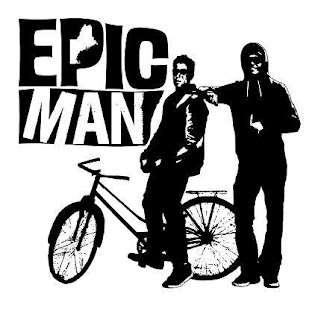It is with that in mind that I introduce you to:
The not-so-obvious reason I am writing about this is that I have the pleasure of joining them for part of the adventure!! As everyone is WELL aware, I have been training for the Zimmerman MS 150 from Miami to Key Largo, where I bike 150 miles to raise funds for the research and treatment of Multiple Sclerosis. It takes place in mid-May, and since I am doing all of my training up north, I have been hard-pressed to find a good training ride to do before the MS Ride. Enter, the Epic Man.
As part of the Portland to Hopkington overnight ride, waves of cyclists are going to join Epic Man on the Portland, ME to Portsmouth, NH leg of the journey (about 50 miles). This portion is sponsored by Trek Portmouth, and you can join in the fun by contacting Olivia. There isn't even a registration fee!! When I spoke to Olivia, she asked that in lieu of a reg fee, a donation ($20 was suggested) be made to Team Trevor, which is the beneficiary of this part of the Epic Man. I actually just took a break from writing this entry to make my donation.
I have been trying desperately to get as much cycling in as possible, but since it's now less than a month until this event, I have more motivation than ever. I'm beyond excited to have a small part in something so amazing, and I hope you, dear reader, are able to join, support or party with Epic Man at some point in their weeks-long journey. Be sure to check out their blog and Facebook page for updates, and I hope to see you at the beginning, end, or somewhere along the route!!
 |
| Alway Be Epic |
What is the Epic Man? I'll let them explain the details. But, as a synopsis, two friends created a challenge that each refused to back down from. Thousands of people run the Boston Marathon - but does anybody do it as part of a triathlon? Enter, the Epic Man. Now in its third year (and incarnation), Epic Man involves running, kayaking, swimming, cycling and, of course, eating and beer drinking. The first year started one day before Marathon Monday and involved a kayak from Peaks Island off the coast of Maine, an overnight bike from Portland, ME to Hopkington, MA, and a running of the Boston Marathon. Amazingly, it has only since grown and now benefits six separate charities.
This year's adventure is one of... well, epic proportions, naturally. In addition to the kayak/bike/run in New England, the Team (which has grown from the original two founders) will spend the weeks prior venturing to Milwaukee, biking to Chicago, giving a lecture in Albany and running through Manhattan in a path that spells the word, "EPIC," among other things. The graphic below highlights the schedule, and you can read a detailed schedule on their website. Did I mention they are also skydiving??
| Check Please! |
So, why am I writing about these guys? A few obvious reasons, and a few not-so-obvious reasons. First, the most obvious: this is probably the coolest thing I have ever heard of. Forget the Warrior Dash (which I am doing) or the Tough Mudder (maybe next year). These guys blow that out of the water. But, it's not about being better, or crazier, or harder than anything else. It's about being EPIC, whatever that means to you. I could never speak for the people who created this, but they write about inspiring others to "be epic" in their own right. We used to have this cheesy saying in high school about "pushing (our) comfortable limits" in order to grow into a better person. This is an embodiment of that. It is also a lesson in overcoming obstacles that is played out in the training and execution of this event, as well as in the charities it supports. Read about last minute changes to last years event due to the erupting volcano in Iceland, and then read the story of Josh, who was the recipient of the first Epic Wish, allowing him to have his own Epic adventure - you will be awed by both.
As part of the Portland to Hopkington overnight ride, waves of cyclists are going to join Epic Man on the Portland, ME to Portsmouth, NH leg of the journey (about 50 miles). This portion is sponsored by Trek Portmouth, and you can join in the fun by contacting Olivia. There isn't even a registration fee!! When I spoke to Olivia, she asked that in lieu of a reg fee, a donation ($20 was suggested) be made to Team Trevor, which is the beneficiary of this part of the Epic Man. I actually just took a break from writing this entry to make my donation.
I have been trying desperately to get as much cycling in as possible, but since it's now less than a month until this event, I have more motivation than ever. I'm beyond excited to have a small part in something so amazing, and I hope you, dear reader, are able to join, support or party with Epic Man at some point in their weeks-long journey. Be sure to check out their blog and Facebook page for updates, and I hope to see you at the beginning, end, or somewhere along the route!!


